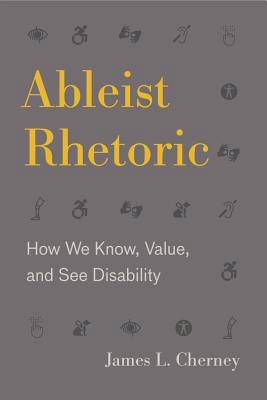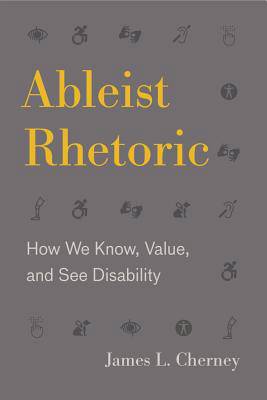
- Retrait gratuit dans votre magasin Club
- 7.000.000 titres dans notre catalogue
- Payer en toute sécurité
- Toujours un magasin près de chez vous
- Retrait gratuit dans votre magasin Club
- 7.000.0000 titres dans notre catalogue
- Payer en toute sécurité
- Toujours un magasin près de chez vous
Description
Ableism, a form of discrimination that elevates "able" bodies over those perceived as less capable, remains one of the most widespread areas of systematic and explicit discrimination in Western culture. Yet in contrast to the substantial body of scholarly work on racism, sexism, classism, and heterosexism, ableism remains undertheorized and underexposed. In this book, James L. Cherney takes a rhetorical approach to the study of ableism to reveal how it has worked its way into our everyday understanding of disability.
Ableist Rhetoric argues that ableism is learned and transmitted through the ways we speak about those with disabilities. Through a series of textual case studies, Cherney identifies three rhetorical norms that help illustrate the widespread influence of ableist ideas in society. He explores the notion that "deviance is evil" by analyzing the possession narratives of Cotton Mather and the modern horror touchstone The Exorcist. He then considers whether "normal is natural" in Aristotle's Generation of Animals and in the cultural debate over cochlear implants. Finally, he shows how the norm "body is able" operates in Alexander Graham Bell's writings on eugenics and in the legal cases brought by disabled athletes Casey Martin and Oscar Pistorius. These three simple equivalencies play complex roles within the social institutions of religion, medicine, law, and sport. Cherney concludes by calling for a rhetorical model of disability, which, he argues, will provide a shift in orientation to challenge ableism's epistemic, ideological, and visual components.
Accessible and compelling, this groundbreaking book will appeal to scholars of rhetoric and of disability studies as well as to disability rights advocates.
Spécifications
Parties prenantes
- Auteur(s) :
- Editeur:
Contenu
- Nombre de pages :
- 200
- Langue:
- Anglais
- Collection :
- Tome:
- n° 11
Caractéristiques
- EAN:
- 9780271084688
- Date de parution :
- 22-10-19
- Format:
- Livre relié
- Format numérique:
- Genaaid
- Dimensions :
- 152 mm x 229 mm
- Poids :
- 467 g

Les avis
Nous publions uniquement les avis qui respectent les conditions requises. Consultez nos conditions pour les avis.






